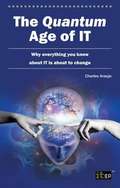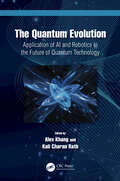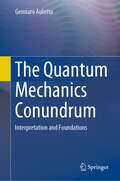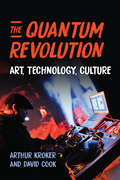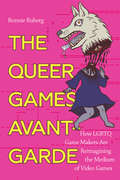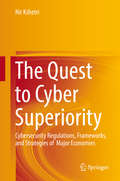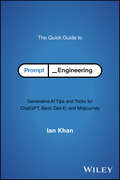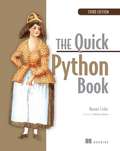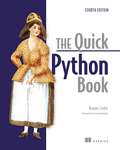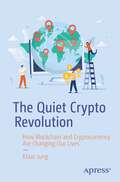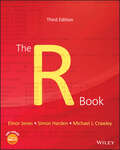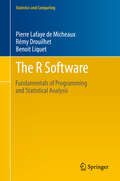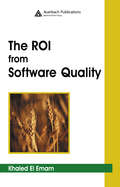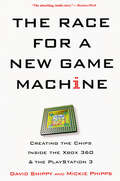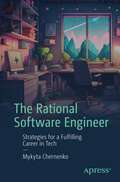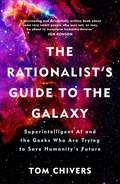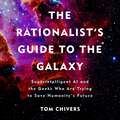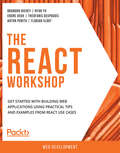- Table View
- List View
The Quantum Age of IT
by Charles Araujo'IT as we know it is dead.' Forces are at work that are reshaping the very fabric of the IT organization. Driven by our own history, changing perceptions of how technology should work and newfound, but very real, competition, IT organizations are struggling to evolve - but into what? In The Quantum Age of IT, Charles Araujo examines what has led us to this point and what it means to the future of IT organizations. With a broad perspective on the fundamental changes affecting the industry, he offers practical guidance that every IT professional needs to compete in this new era of IT. Whether you are an IT executive, or just beginning your career, this book will offer you the key insights you need to understand what is happening and what is coming. Understanding that future, Araujo blends a wide range of research and case studies to help you discover the skills you must develop in order to succeed and thrive in The Quantum Age of IT. As you read this book, you will be able to: • Understand how and why your IT function has changed and define its future role • Compete in this new age by embracing the five traits that will define the IT organization of The Quantum Age • Remain effective and relevant as you understand and implement fundamental changes to future-proof your IT function • Maintain and develop excellent customer relations by better understanding your clients and their requirements • Meet the unique needs of all your customers, as you adopt the five key skills that all IT professionals will have to have • Learn from the past and look forward to a bright future!
The Quantum Evolution: Application of AI and Robotics in the Future of Quantum Technology
by Alex Khang Kali Charan RathThe book offers a comprehensive exploration of the fusion between quantum technology, AI, and robotics, providing readers with a deep understanding of the interplay between these fields and the transformative potential they hold.The Quantum Evolution: Application of AI and Robotics in the Future of Quantum Technology uncovers the potential of quantum algorithms to tackle complex computational problems exponentially faster than classical counterparts. Readers are introduced to quantum machine learning and its potential to revolutionize AI by enabling more efficient data analysis, pattern recognition, and decision-making. The book explores the potential applications of quantum-inspired neural networks and how they can enhance the capabilities of AI systems, ushering in a new era of intelligent machines. It also delves into the potential risks and challenges associated with quantum technology integration, such as quantum security and privacy concerns. The book showcases numerous real-world applications and examples of how quantum technology, AI, and robotics are being utilized today, giving readers concrete insights into how these advancements are shaping industries, health care, communication, and more.This book targets a mixed audience of specialists, analysts, engineers, scholars, researchers, academics, professionals, and students from different communities to share and contribute new ideas, methodologies, technologies, models, frameworks, theories, and practices in quantum technology.
The Quantum Internet: Ultrafast and Safe from Hackers
by Gösta FürnkranzThe internet can look forward to a fantastic future! With new quantum technology, hacker-proof exchange of information and ultrafast data processing will become possible. The basis for these is Albert Einstein's "quantum spook". We are not dealing here with sorcery, but with hard-core science. This book undertakes a fascinating journey through the world of our quantum future - from the first "quantum satellite" to high-security internet, the quantum cloud and beyond, to partly futuristic applications. The author guides the reader through the basic ideas of quantum physics, explains the concepts of quantum computers, quantum cryptography, and quantum teleportation, and then establishes their relationship to the quantum Internet. Special attention is paid not only to the technical challenges involved, but also to the likely effects on society. Alongside examples of implementation, the author intersperses delightful anecdotes, which bring the story to life. With this book you will learn how quantum physics can revolutionize the internet! "... in lively prose the author presents the current state of research in its whole breadth and splendour – valuable and entertaining reading!” Rupert Ursin, Group Leader and Vice Director of the Institute for Quantum Optics and Quantum Information, Vienna
The Quantum Mechanics Conundrum: Interpretation and Foundations
by Gennaro AulettaThis comprehensive volume gives a balanced and systematic treatment of both the interpretation and the mathematical-conceptual foundations of quantum mechanics. It is written in a pedagogical style and addresses many thorny problems of fundamental physics.The first aspect concerns Interpretation. The author raises the central problems: formalism, measurement, non-locality, and causality. The main positions on these subjects are presented and critically analysed. The aim is to show that the main schools can converge on a core interpretation. The second aspect concerns Foundations. Here it is shown that the whole theory can be grounded on information theory. The distinction between information and signal leads us to integrating quantum mechanics and relativity. Category theory is presented and its significance for quantum information shown; the logic and epistemological bases of the theory are assessed.Of relevance to all physicists and philosophers with an interest in quantum theory and its foundations, this book is destined to become a classic work.
The Quantum Revolution: Art, Technology, Culture (Digital Futures)
by David Cook Arthur KrokerWe are currently riders of the information storm. AI fascinates us, images mesmerize us, data defines us, algorithms remember us, news bombards us, devices connect us, isolation saddens us. Deeply embedded in digital technology, we are the very first inhabitants of life in the quantum zone. The Quantum Revolution is about life today – its entanglements, creativity, politics, and artistic vision. Arthur Kroker and David Cook explore a new way of thinking drawn directly from the quantum imaginary itself. They explain the quantum revolution as everyday life, where technology moves fast, and where, under cover of the digital devices that connect us, the most sophisticated concepts of technology and science originating in mathematics, astrophysics, and biogenetics have swiftly flooded human consciousness, shaped social behavior, and crafted individual identity. The book discusses the concept of the quantum zone as a new way of understanding digital culture, and presents stories about art, technology, and society, as well as a series of reflections on art as a gateway to understanding the quantum imaginary. Richly illustrated with sixty images of critically engaged photos and artwork, The Quantum Revolution privileges a new way of understanding and seeing politics, society, and culture through the lens of the duality that is the essence of the quantum imaginary.
The Queer Games Avant-Garde: How LGBTQ Game Makers Are Reimagining the Medium of Video Games
by Bonnie RubergIn The Queer Games Avant-Garde, Bonnie Ruberg presents twenty interviews with twenty-two queer video game developers whose radical, experimental, vibrant, and deeply queer work is driving a momentous shift in the medium of video games. Speaking with insight and candor about their creative practices as well as their politics and passions, these influential and innovative game makers tell stories about their lives and inspirations, the challenges they face, and the ways they understand their places within the wider terrain of video game culture. Their insights go beyond typical conversations about LGBTQ representation in video games or how to improve “diversity” in digital media. Instead, they explore queer game-making practices, the politics of queer independent video games, how queerness can be expressed as an aesthetic practice, the influence of feminist art on their work, and the future of queer video games and technology. These engaging conversations offer a portrait of an influential community that is subverting and redefining the medium of video games by placing queerness front and center.Interviewees:Ryan Rose Aceae, Avery Alder, Jimmy Andrews, Santo Aveiro-Ojeda, Aevee Bee, Tonia B******, Mattie Brice, Nicky Case, Naomi Clark, Mo Cohen, Heather Flowers, Nina Freeman, Jerome Hagen, Kat Jones, Jess Marcotte, Andi McClure, Llaura McGee, Seanna Musgrave, Liz Ryerson, Elizabeth Sampat, Loren Schmidt, Sarah Schoemann, Dietrich Squinkifer, Kara Stone, Emilia Yang, Robert Yang
The Quest for Artificial Intelligence
by Nils J. NilssonArtificial intelligence (AI) is a field within computer science that is attempting to build enhanced intelligence into computer systems. This book traces the history of the subject, from the early dreams of eighteenth-century (and earlier) pioneers to the more successful work of today's AI engineers. AI is becoming more and more a part of everyone's life. The technology is already embedded in face-recognizing cameras, speech-recognition software, Internet search engines, and health-care robots, among other applications. The book's many diagrams and easy-to-understand descriptions of AI programs will help the casual reader gain an understanding of how these and other AI systems actually work. Its thorough (but unobtrusive) end-of-chapter notes containing citations to important source materials will be of great use to AI scholars and researchers. This book promises to be the definitive history of a field that has captivated the imaginations of scientists, philosophers, and writers for centuries.
The Quest for the Diamond Sword: An Unofficial Minecrafters Adventure (An Unofficial Gamer's Adventure)
by Winter MorganFor every boy and girl who loves Minecraft, a brand-new illustrated edition of the bestselling adventure novel by author Winter Morgan with 75 full-color illustrations. Steve lives on a wheat farm. He has everything he needs to live in the Minecraft world: a bed, a house, and food. Steve likes to spend his mornings in the NPC village and trade his wheat for emeralds, armor, books, swords, and food. One morning, he finds that Zombies have attacked the villagers. The Zombies have also turned the village blacksmith into a Zombie, leaving Steve without a place to get swords. To protect himself and the few villagers that remain, Steve goes on a quest to mine for forty diamonds, which are the most powerful mineral in the Overworld. He wants to craft these diamonds into a diamond sword to shield him and the villagers from the Zombies. Far from his home, with night about to set in, Steve fears for his life. Nighttime is when users are most vulnerable in Minecraft. As he looks for shelter in a temple, he meets a trio of treasure hunters, Max, Lucy, and Henry, who are trying to unearth the treasure under the temple. Steve tells them of his master plan to mine for the most powerful mineral in the Overworld—the diamond. The treasure hunters are eager to join him. Facing treacherous mining conditions, a thunderstorm, and attacks from hostile mobs, these four friends&’ question if it&’s better to be a single player than a multiplayer, as they try to watch out for each other and chase Steve&’s dream at the same time. Will Steve find the diamonds? Will his friends help or hinder the search? Should he trust his new treasure hunter friends? And will Steve get back in time to save the villagers?
The Quest to Cyber Superiority
by Nir KshetriThis book explains how major world economies are recognizing the need for a major push in cyber policy environments. It helps readers understand why these nations are committing substantial resources to cybersecurity, and to the development of standards, rules and guidelines in order to address cyber-threats and catch up with global trends and technological developments. A key focus is on specific countries' engagement in cyberattacks and the development of cyber-warfare capabilities. Further, the book demonstrates how a nation's technological advancement may not necessarily lead to cyber-superiority. It covers cybersecurity issues with regard to conflicts that shape relationships between major economies, and explains how attempts to secure the cyber domain have been hampered by the lack of an international consensus on key issues and concepts. The book also reveals how some economies are now facing a tricky trade-off between economically productive uses of emerging technologies and an enhanced cybersecurity profile. In the context of current paradigms related to the linkages between security and trade/investment, it also delves into new perspectives that are being brought to light by emerging cybersecurity issues.
The Quick Guide to Prompt Engineering: Generative AI Tips and Tricks for ChatGPT, Bard, Dall-E, and Midjourney
by Ian KhanDesign and use generative AI prompts that get helpful and practical results In The Quick Guide to Prompt Engineering, renowned technology futurist, management consultant, and AI thought leader Ian Khan delivers a practical and insightful discussion on taking the first steps in understanding and learning how to use generative AI. In this concise and quick start guide, you will learn how to design and use prompts to get the most out of Large Language Model generative AI applications like ChatGPT, DALL-E, Google’s Bard, and more. In the book, you’ll explore how to understand generative artificial intelligence and how to engineer prompts in a wide variety of industry use cases. You’ll also find thoughtful and illuminating case studies and hands-on exercises, as well as step-by-step guides, to get you up to speed on prompt engineering in no time at all. The book has been written for the non-technical user to take the first steps in the world of generative AI. Along with a helpful glossary of common terms, lists of useful additional reading and resources, and other resources, you’ll get: Explanations of the basics of generative artificial intelligence that help you to learn what’s going on under the hood of ChatGPT and other LLMs Stepwise guides to creating effective, efficient, and ethical prompts that help you get the most utility possible from these exciting new tools Strategies for generating text, images, video, voice, music, and other audio from various publicly available artificial intelligence tools Perfect for anyone with an interest in one of the newest and most practical technological advancements recently released to the public, The Quick Guide to Prompt Engineering is a must-read for tech enthusiasts, marketers, content creators, technical professionals, data experts, and anyone else expected to understand and use generative AI at work or at home. No previous experience is required.
The Quick Python Book
by Naomi CederSummary This third revision of Manning's popular The Quick Python Book offers a clear, crisp updated introduction to the elegant Python programming language and its famously easy-to-read syntax. Written for programmers new to Python, this latest edition includes new exercises throughout. It covers features common to other languages concisely, while introducing Python's comprehensive standard functions library and unique features in detail. Foreword by Nicholas Tollervey, Python Software Foundation. Purchase of the print book includes a free eBook in PDF, Kindle, and ePub formats from Manning Publications. About the Technology Initially Guido van Rossum's 1989 holiday project, Python has grown into an amazing computer language. It's a joy to learn and read, and powerful enough to handle everything from low-level system resources to advanced applications like deep learning. Elegantly simple and complete, it also boasts a massive ecosystem of libraries and frameworks. Python programmers are in high demand/mdash;you can't afford not to be fluent! About the Book The Quick Python Book, Third Edition is a comprehensive guide to the Python language by a Python authority, Naomi Ceder. With the personal touch of a skilled teacher, she beautifully balances details of the language with the insights and advice you need to handle any task. Extensive, relevant examples and learn-by-doing exercises help you master each important concept the first time through. Whether you're scraping websites or playing around with nested tuples, you'll appreciate this book's clarity, focus, and attention to detail. What's Inside Clear coverage of Python 3 Core libraries, packages, and tools In-depth exercises Five new data science-related chapters About the Reader Written for readers familiar with programming concepts--no Python experience assumed. About the Author Naomi Ceder is chair of the Python Software Foundation. She has been learning, using, and teaching Python since 2001. Table of Contents PART 1 - STARTING OUT 1. About Python 2. Getting started 3. The Quick Python overview PART 2 - THE ESSENTIALS 4. The absolute basics 5. Lists, tuples, and sets 6. Strings 7. Dictionaries 8. Control flow 9. Functions 10. Modules and scoping rules 11. Python programs 12. Using the filesystem 13. Reading and writing files 14. Exceptions PART 3 - ADVANCED LANGUAGE FEATURES 15. Classes and object-oriented programming 16. Regular expressions 17. Data types as objects 18. Packages 19. Using Python libraries PART 4 - WORKING WITH DATA 20. Basic file wrangling 21. Processing data files 22. Data over the network 23. Saving data 24. Exploring data
The Quick Python Book, Fourth Edition
by Naomi CederA fast-paced introduction to Python for intermediate developers–now with coverage of generative AI!For over 25 years, The Quick Python Book has been one of the best Python books money can buy. It concisely covers programming basics, while introducing Python's comprehensive standard library and unique features in depth and detail. In this fourth edition, you&’ll find new coverage of AI coding tools like Copilot and Google's Colaboratory (Colab), and develop a mindset that can make the most of AI. The Quick Python Book, Fourth Edition includes: • Python syntax, data structures, and best practices • Python as an object oriented language • Common Python libraries • Basic data handling with Python • Using AI code generation tools with Python Whether you&’re new to Python or looking to advance your basic skills, The Quick Python Book, Fourth Edition will get you writing effective Python code fast. Python authority and former Chair of the Python Software Foundation Board or Directors Naomi Ceder has returned to author this extensively revised fourth edition. With the personal touch of a skilled teacher, Naomi beautifully balances details of the language with the insights and advice you need to handle any task. Foreword by Luciano Ramalho. About the technology System automation. High-performance web apps. Cloud and back-end services. Cutting edge AI. No matter what you&’re building, it pays to know how to read and write Python! The Quick Python Book has helped over 100,000 developers get up to speed with the Python programming language. This revised Fourth Edition, fully updated for Python 3.13, explores the latest features and libraries and shows you how to code smarter with AI tools like ChatGPT. About the book The Quick Python Book, Fourth Edition teaches you the essential Python features and techniques you need for most common scripting, application programming, and data science tasks. Written for developers comfortable with another programming language, it dives right into the good stuff. New interactive notebooks, quick-check questions, and end-of-chapter labs all help practice and consolidate your new skills. Plus, you&’ll find practical advice on writing prompts and using AI assistants to accelerate your day-to-day work. What's inside • Python syntax, data structures, and best practices • Object-oriented Python • Must-know Python libraries • Data handling About the reader For beginning-intermediate programmers. No prior experience with Python required. About the author Naomi Ceder has been learning, teaching, and writing about Python since 2001. An elected fellow of the Python Software Foundation, Naomi is a past chair of its board of directors. In 2022 she became the seventh person to receive the PSF Distinguished Service Award. Table of Contents Part 1 1 About Python 2 Getting started 3 The quick Python overview Part 2 4 The absolute basics 5 Lists, tuples, and sets 6 Strings 7 Dictionaries 8 Control flow 9 Functions 10 Modules and scoping rules 11 Python programs 12 Using the filesystem 13 Reading and writing files 14 Exceptions Part 3 15 Classes and object-oriented programming 16 Regular expressions 17 Data types as objects 18 Packages 19 Using Python libraries Part 4 20 Basic file wrangling 21 Processing data files 22 Data over the network 23 Saving data 24 Exploring data Appendix A guide to Python&’s documentation
The Quiet Crypto Revolution: How Blockchain and Cryptocurrency Are Changing Our Lives
by Klaas JungCrypto is going to change the world, and for those tired of confusing financial jargon and complicated technical terminology, look no further. This book demystifies the world of cryptocurrencies and blockchain technology and explains in accessible language how it will affect your daily life. In The Quiet Crypto Revolution, Klaas Jung dives beneath the surface of Bitcoin to explore the engine that powers it - blockchain. Far surpassing the confines of cryptocurrencies, blockchain's potential for wide-ranging applications is enormous. It's crucial to understand that cryptocurrencies are merely a single manifestation of blockchain's capabilities. This book casts light on the broader spectrum of blockchain applications and the exciting future of this groundbreaking technology. With a focus on real-world applications, you'll gain a deeper understanding of the key concepts behind the innovative technology of blockchain, equipping you to make informed decisions. Whether you're a tech-savvy individual or a complete newcomer to the world of crypto and finance, this book will arm you with the knowledge and insights you need to understand the impact cryptocurrency and blockchain will have on your future.You WillLook at the future of blockchain technologyReview potential use cases for blockchain beyond cryptocurrencyStudy security strategies to avoid scams in the crypto spaceWho This Book Is ForBeginners who would like to gain a better understanding of cryptocurrency and the technology that supports it.
The R Book
by Michael J. Crawley Elinor Jones Simon HardenA start-to-finish guide to one of the most useful programming languages for researchers in a variety of fields In the newly revised Third Edition of The R Book, a team of distinguished teachers and researchers delivers a user-friendly and comprehensive discussion of foundational and advanced topics in the R software language, which is used widely in science, engineering, medicine, economics, and other fields. The book is designed to be used as both a complete text—readable from cover to cover—and as a reference manual for practitioners seeking authoritative guidance on particular topics. This latest edition offers instruction on the use of the RStudio GUI, an easy-to-use environment for those new to R. It provides readers with a complete walkthrough of the R language, beginning at a point that assumes no prior knowledge of R and very little previous knowledge of statistics. Readers will also find: A thorough introduction to fundamental concepts in statistics and step-by-step roadmaps to their implementation in R; Comprehensive explorations of worked examples in R; A complementary companion website with downloadable datasets that are used in the book; In-depth examination of essential R packages. Perfect for undergraduate and postgraduate students of science, engineering, medicine economics, and geography, The R Book will also earn a place in the libraries of social sciences professionals.
The R Software
by Pierre Lafaye de Micheaux Rémy Drouilhet Benoit LiquetThe contents of The R Software are presented so as to be both comprehensive and easy for the reader to use. Besides its application as a self-learning text, this book can support lectures on R at any level from beginner to advanced. This book can serve as a textbook on R for beginners as well as more advanced users, working on Windows, MacOs or Linux OSes. The first part of the book deals with the heart of the R language and its fundamental concepts, including data organization, import and export, various manipulations, documentation, plots, programming and maintenance. The last chapter in this part deals with oriented object programming as well as interfacing R with C/C++ or Fortran, and contains a section on debugging techniques. This is followed by the second part of the book, which provides detailed explanations on how to perform many standard statistical analyses, mainly in the Biostatistics field. Topics from mathematical and statistical settings that are included are matrix operations, integration, optimization, descriptive statistics, simulations, confidence intervals and hypothesis testing, simple and multiple linear regression, and analysis of variance. Each statistical chapter in the second part relies on one or more real biomedical data sets, kindly made available by the Bordeaux School of Public Health (Institut de Santé Publique, d'Épidémiologie et de Développement - ISPED) and described at the beginning of the book. Each chapter ends with an assessment section: memorandum of most important terms, followed by a section of theoretical exercises (to be done on paper), which can be used as questions for a test. Moreover, worksheets enable the reader to check his new abilities in R. Solutions to all exercises and worksheets are included in this book.
The ROI from Software Quality
by Khaled El EmamThe ROI from Software Quality provides the tools needed for software engineers and project managers to calculate how much they should invest in quality, what benefits the investment will reap, and just how quickly those benefits will be realized. This text provides the quantitative models necessary for making real and reasonable calculations and it
The Race For A New Game Machine:
by David Shippy Mickie PhippsThe pioneering game-chip engineers behind the revolutionary Cell microprocessor tell the story of its creation in this &“fast-paced tell-all&” (Steve Cherry, IEEE Spectrum Magazine). The Xbox 360 and PlayStation 3 game systems have changed the face of home entertainment. But few know the amazing story inside the consoles—how David Shippy and his team of engineers at the Sony/Toshiba/IBM Design Center (STI) forged the tiny miracle at the core of it all: a revolutionary microprocessor chip that set a new paradigm in personal computing. In The Race for a New Gaming Machine, Shippy tells the dramatic story in his own words. Here is a dazzling, behind-the-scenes account of life in the tech world, featuring memorable characters, high-level corporate intrigue, and cutthroat business dealings. At stake were the livelihoods—and sanity—of an unsung group of tireless visionaries. At war were the giants Microsoft and Sony. It's a story that's never been told—until now.
The Ransomware Hunting Team: A Band of Misfits' Improbable Crusade to Save the World from Cybercrime
by Daniel Golden Renee DudleyA real-life technological thriller about a band of eccentric misfits taking on the biggest cybersecurity threats of our time.“What Michael Lewis did for baseball in Moneyball, Renee Dudley and Daniel Golden do brilliantly for the world of ransomware and hackers. Cinematic, big in scope, and meticulously reported, this book is impossible to put down.” —Doug Stanton, New York Times bestselling author of In Harm’s Way and Horse SoldiersScattered across the world, an elite team of code crackers is working tirelessly to thwart the defining cyber scourge of our time. You’ve probably never heard of them. But if you work for a school, a business, a hospital, or a municipal government, or simply cherish your digital data, you may be painfully familiar with the team’s sworn enemy: ransomware. Again and again, an unlikely band of misfits, mostly self-taught and often struggling to make ends meet, have outwitted the underworld of hackers who lock computer networks and demand huge payments in return for the keys.The Ransomware Hunting Team traces the adventures of these unassuming heroes and how they have used their skills to save millions of ransomware victims from paying billions of dollars to criminals. Working tirelessly from bedrooms and back offices, and refusing payment, they’ve rescued those whom the often hapless FBI has been unwilling or unable to help. Foremost among them is Michael Gillespie, a cancer survivor and cat lover who got his start cracking ransomware while working at a Nerds on Call store in the town of Normal, Illinois. Other teammates include the brilliant, reclusive Fabian Wosar, a high school dropout from Germany who enjoys bantering with the attackers he foils, and his protégé, the British computer science prodigy Sarah White. Together, they have established themselves as the most effective force against an escalating global threat. This book follows them as they put their health, personal relationships, and financial security on the line to navigate the technological and moral challenges of combating digital hostage taking.Urgent, uplifting, and entertaining, Renee Dudley and Daniel Golden’s The Ransomware Hunting Team is a real-life technological thriller that illuminates a dangerous new era of cybercrime.
The Rational Software Engineer: Strategies for a Fulfilling Career in Tech
by Mykyta ChernenkoThis book will serve as a framework for you as a software engineer seeking a fulfilling career and wishing to stay passionate and maintain a healthy mental state. It is filled with protocols to achieve effective life-long learning, navigate career development, adapt to changes, maintain work-life balance, and have a healthy lifestyle.As a successful software engineer you tend to focus on improving your technical skills: learning a new programming language, mastering another tool, or using a library. But you also need to build a solid mental framework that will help you navigate your professional development. You need to develop the skills that will help you be a happy software engineer.This book will help you if you feel frustrated, unmotivated, or unhappy; lost in your career path; or uncertain if you want to be a software engineer. It can help you deal with burnout, high levels of stress, or depression; or if you struggle to be productive while working from home. What You Will LearnEfficiently organize your work dayKnow when and how to seek a new project, company, or careerTake care of your body and mind in a software engineering contextUnderstand what contributes to job satisfaction and how to integrate it into your careerUse non-coding activities for your and your company’s benefitBuild healthy relationships with managers and colleaguesWho This Book Is ForThe typical reader of this book is a software engineer who is highly skilled in technical areas but may feel frustrated, unmotivated, or unhappy in their current position and looking for a way to navigate their professional development and find a healthy work-life balance.The book also will appeal to audiences of other IT or tech professionals, such as project managers, product owners, or designers, who work closely with software engineers and want to understand the challenges they face in their roles. Additionally, individuals who are considering a career in software engineering or development may benefit from the book by gaining insight into the profession and understanding the skills and mindset required to be successful.
The Rationalist's Guide to the Galaxy: Superintelligent AI and the Geeks Who Are Trying to Save Humanity's Future
by Tom Chivers'A fascinating and delightfully written book about some very smart people who may not, or may, be about to transform humanity forever' JON RONSON'Beautifully written, and with wonderful humour, this is a thrilling adventure story of our own future' LEWIS DARTNELL, author of THE KNOWLEDGE and ORIGINSAre paperclips going to destroy life as we know it?What can Mickey Mouse teach us about how to programme AI?Could a more rational approach to life be what saves us all?This is a book about about a community of people who are trying to think rationally about intelligence and what insight they can and can't give us about the future of the human race. It explains why these people are worried about an AI apocalypse, why they might be right, and why they might be wrong. It is a book about the cutting edge of our thinking on intelligence and rationality right now by the people who stay up all night worrying about it.
The Rationalist's Guide to the Galaxy: Superintelligent AI and the Geeks Who Are Trying to Save Humanity's Future
by Tom Chivers'A fascinating and delightfully written book about some very smart people who may not, or may, be about to transform humanity forever' JON RONSON'The AI does not hate you, nor does it love you, but you are made of atoms which it can use for something else'This is a book about AI and AI risk. But it's also more importantly about a community of people who are trying to think rationally about intelligence, and the places that these thoughts are taking them, and what insight they can and can't give us about the future of the human race over the next few years. It explains why these people are worried, why they might be right, and why they might be wrong.It isn't, on the other hand, a book about the future - it doesn't try to guess how many of us are going to be put out of work by AI, or what the operating system in your house might be able to do ten years hence. Instead, this is a book about the cutting edge of our thinking on intelligence and rationality right now by the people who stay up all night worrying about it.Along the way, we discover why we probably don't need to worry about a future AI resurrecting a perfect copy of our minds and torturing us for not inventing it sooner but we should be concerned about paperclips destroying life as we know it; how Mickey Mouse can teach us an important lesson about how to programme AI; and why Spock is not as logical as we think he is.(p) Orion Publishing Group Ltd 2019
The Re-Evolution of American Street Gangs
by Dale L. June Mohamad Khatibloo Gregorio EstevaneThe problem of gangs and gang subculture is a growing threat to the stability of neighborhoods and entire communities. During the past two decades, gang members have increasingly migrated from large urban centers to suburban areas and other countries. This book addresses the intricacies and diversities of street gangs, drawing on the expertise of h
The React Workshop: Get started with building web applications using practical tips and examples from React use cases
by Brandon Richey Ryan Yu Endre Vegh Theofanis Despoudis Anton PunithWork through engaging exercises and activities and gain practical skills to make your web applications function effortlessly with the help of React Key Features Explore the React environment by creating live projects Solve real-world problems relating to building modern web applications Gain a thorough understanding of how data moves through different React components Book Description Are you interested in how React takes command of the view layer for web and mobile apps and changes the data of large web applications without needing to reload the page? This workshop will help you learn how and show you how to develop and enhance web apps using the features of the React framework with interesting examples and exercises. The workshop starts by demonstrating how to create your first React project. You'll tap into React's popular feature JSX to develop templates and use DOM events to make your project interactive. Next, you'll focus on the lifecycle of the React component and understand how components are created, mounted, unmounted, and destroyed. Later, you'll create and customize components to understand the data flow in React and how props and state communicate between components. You'll also use Formik to create forms in React to explore the concept of controlled and uncontrolled components and even play with React Router to navigate between React components. The chapters that follow will help you build an interesting image-search app to fetch data from the outside world and populate the data to the React app. Finally, you'll understand what ref API is and how it is used to manipulate DOM in an imperative way. By the end of this React book, you'll have the skills you need to set up and create web apps using React. What you will learn Use JSX to include logic in the view layer of applications Get familiar with the important methods and events in the React lifecycle Distinguish between class and functional component syntaxes Create forms with Formik and handle errors Understand the React Hooks API and the problems it can solve Fetch outside data using the Axios library and populate the data to the app Who this book is for The React Workshop is for web developers and programmers who are looking to learn React and use it for creating and enhancing web applications. Although the workshop is for beginners, prior knowledge of JavaScript programming and HTML and CSS is necessary to easily understand the concepts that are covered.
The Read Aloud Cloud: An Innocent's Guide to the Tech Inside
by Forrest BrazealWhat is “the cloud”? Is it here or there? Should it be allowed? Should I even care? Have you ever imagined the internet as a giant Rube Goldberg machine? Or the fast-evolving cloud computing space as a literal jungle filled with prehistoric beasts? Does a data breach look like a neo-noir nightmare full of turned-up coat collars and rain-soaked alleys? Wouldn’t all these vital concepts be easier to understand if they looked as interesting as they are? And wouldn’t they be more memorable if we could explain them in rhyme? Whether you’re a kid or an adult, the answer is: YES! The medicine in this spoonful of sugar is a sneaky-informative tour through the past, present and future of cloud computing, from mainframes to serverless and from the Internet of Things to artificial intelligence. Forrest is a professional explainer whose highly-rated conference talks and viral cartoon graphics have been teaching engineers to cloud for years. He knows that a picture is worth a thousand words. But he has plenty of words, too. Your hotel key, your boarding pass,The card you swipe to pay for gas,The smart TV atop the bar,The entertainment in your car,Your doorbell, toothbrush, thermostat,The vacuum that attacked your cat,They all connect the cloud and you.Maybe they shouldn't, but they do. As a graduation gift (call it “Oh the Places You’ll Go” for engineering students), a cubicle conversation starter, or just a delightfully nerdy bedtime story for your kids, “The Read-Aloud Cloud” will be the definitive introduction to the technologies that everyone uses and nobody understands. You can even read it silently if you want. But good luck with that.
The Real Business of Web Design
by John WatersWritten by a veteran Web designer, The Real Business of Web Design goes beyond the usual philosophy of simply creating a better customer experience online. Instead, it provides an array of visual design practices and tested business principles for clarifying and simplifying the Web development process and making a Website more customer friendly. Filled with anecdotes from the author’s own experiences in the web design trenches, this guide shows readers how to use the Web in crucial ways to streamline communications, speed up transactions, boost profits, and much more. Anyone who wants to use the Internet as a valuable business tool should not be without this visionary resource! Author is a well-known and highly respected designer Combines visual design insights and proven business practices at a reasonable priceAllworth Press, an imprint of Skyhorse Publishing, publishes a broad range of books on the visual and performing arts, with emphasis on the business of art. Our titles cover subjects such as graphic design, theater, branding, fine art, photography, interior design, writing, acting, film, how to start careers, business and legal forms, business practices, and more. While we don't aspire to publish a New York Times bestseller or a national bestseller, we are deeply committed to quality books that help creative professionals succeed and thrive. We often publish in areas overlooked by other publishers and welcome the author whose expertise can help our audience of readers.
